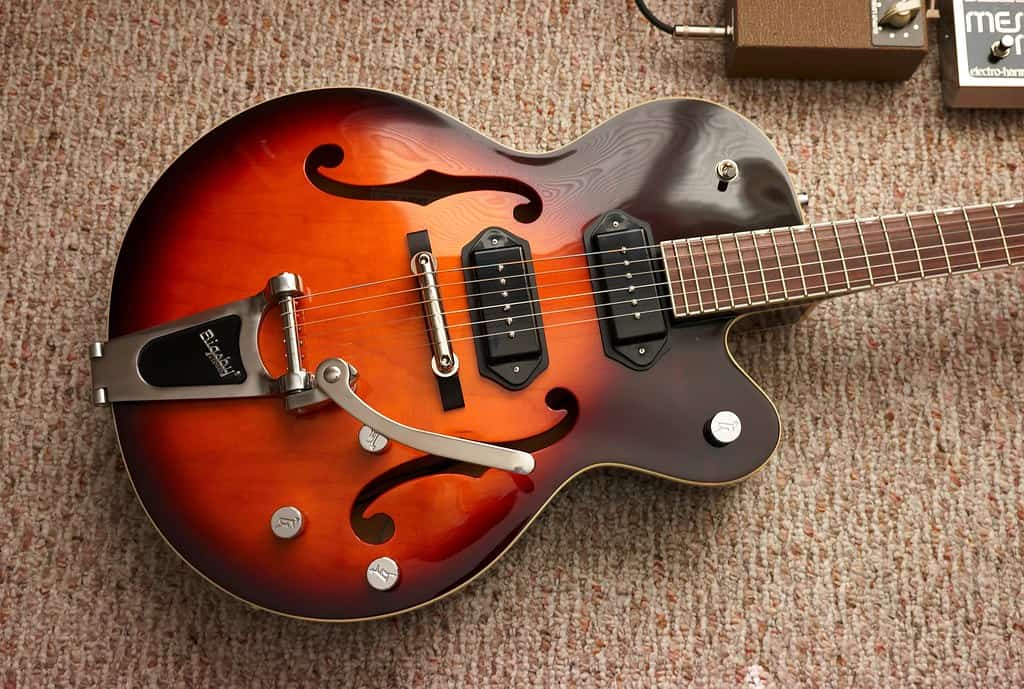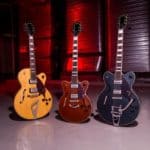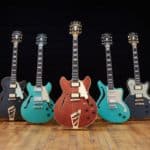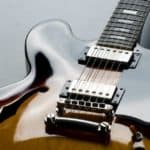Gretsch is a brand well-known for its hollow and semi-hollow body guitars, a type of guitar that’s the bread and butter for many jazz guitarists.
However, not many players of this genre pick Gretsch guitars as their weapon of choice.
Why is this?
Are Gretsch guitars not good enough for jazz?
Well, here is a short answer to this question:
Gretsch guitars can be used to play jazz, and in fact, many famous players do use them. However, they are stigmatized by some jazz purists that prefer the darker and smoother sound of Gibson archtops. Gretsch guitars sound, by design, brighter and more twangy, but this also makes them more versatile.
If you want to dive deeper into this topic, and know the main reasons why jazzists usually go for other brands, keep reading.
In this article, I will try to mention some of the pros and cons that these guitars have with respect to jazz, and to determine why lots of players run away from them.
Are you ready to get started?
Let’s go!
Why many jazz players don’t like Gretsch guitars?
To be honest, Jazzers tend to be really pragmatic with their gear.
From amps to pedals to guitars, you could find players under the broad umbrella of “jazz” playing almost any piece of gear.
I’m talking about purists or traditional jazz players here. So, please, fusion and avant-garde guys, don’t be offended by my generalizations.
It’s true that Gretschs bear some sort of implicit stigma in this small compartment of the musical scene.
I think they are seen, in most cases, as the guitar someone would use if there’s nothing else available at the moment.
Or perhaps the instrument of someone not fully committed to jazz.
The thing is that Gibson is probably the gold standard for many devotes to the genre.
And it could be mostly because of tradition, but also there’s an argument to be had about tone.
Gibson jazz boxes (and every other guitar inspired on them) just sound darker. And traditional jazz is all about that darker smooth sound.
Gretschs, on the other hand, are way twangier and have a brighter tone. Probably because of their construction, but mostly, I’d say is due to their pickups.
Traditionally, Gretsch guitars use Filter’Tron pickups, which are technically humbuckers, but way brighter and with more twang than Gibson’s PAFs.
Tailpieces could be another issue to many players since Gretsch uses Bigsbys in many of their models, and vibrato tailpieces are not that popular for jazz.
Of course, you can change them for any other kind of tailpiece, but so you could do with the pickups, and even then, these mods are not that popular.
Finally, I would mention looks.
Some Gretschs are a bit flashy, and many jazz players would likely prefer a more low-profile look for their instruments.
What makes the Gretsch sound great for jazz?
In opposition to what’s mentioned above, I think Gretsch guitars can have their own space within the jazz genre.
They won’t ever sound traditional, I get it, but I think there are use cases for them.
Let’s look at what these guitars have going to work as jazz machines:
- They have a great construction quality
- There are many hollow models to choose from
- The extra twang could be great for playing rhythm with a pick
- Bigsbys are polarizing, but some tasteful vibrato when playing chords is great
And also, I think the twang can be tamed with the tone controls.
Of course, a purist will argue against having to play a guitar exclusively with the tone pot closed to fit a genre, but hey, this is music. There are no rules.
Another point to consider, but not as a pro jazz argument, is versatility.
When budgets are tight, and you enjoy playing many genres, a Gretsch will perhaps fit better a pop, country, classic rock, or rockabilly environment.
Yes, I know, jack of all trades, master of none, but whatever.
I think Gretschs have a lot to offer to open-minded jazz players.
You just have to think a bit out of the box.
The jazz box.
Best Gretsch models for jazz
This is provoking, I know.
But if you were looking for a Gretsch guitar to play jazz, I think you would find some very compelling options.
To be brief, here is a list of what I think are the best Gretsch guitar to play jazz:
1. Streamliners with P90s

Models such as the 2420, or the 2622, which come factory fitted with P90 pickups would be a great budget option for anyone looking for a jazz guitar under $600.
The caveat here is that P90s might not be for everyone, but I really love how they sound in a jazz box.
2. Any guitar from the Streamliner line

Pickups from the Streamliner line are voiced to sound more like PAFs, so if in a budget, maybe that’s a nice alternative.
From hollow bodies with a center block to Duo Jets, the range is wide, but for each their own.
3. Big hollow bodies from the 61 line
When money is not a limiting factor, and you can shoot for the big boys, things get interesting.
All Gretsch models which nomenclature starts with a 61 are American-made hollow-body instruments.
In this range, you will find most of Gretsch’s flagships, so if their distinctive sound is what you’re looking for, you will be just fine.
4. Any model with Dynasonic pickups
Dynasonic pickups are Gretsch’s spin on single-coil pickups.
Of course, single coils in a hollow body are not what many players would think of when talking about a jazz tone, but I think they are worth a try.
Jazz players that use Gretsch guitars
Just to motivate even further the argument that Gretsch guitars are perfectly usable for playing jazz tunes, here is a list with some of the most famous jazz players that used a Gretsch at least at some point in their careers:
- Bucky Pizzarelli
- Freddie Green
- Julian Lage
- George Van Eps
- Mickey Baker
- Sal Salvador
- Brad Shepik
- Harry Volpe
- Artie Narvaez
- Mary Osborne
- Al Caiola
- Hank Garland
- Cal Collins
- Nelson Symonds
- Billy Bean
- Bill Jennings
Conclusion
Many players obsess over their gear.
And this is a hard critique to start from “GearAficionado”, but even being a Gear nerd, it’s important to take a step back sometimes and just think about what we are here for.
Music should be the priority always, and to be candid, people listening to your playing will hardly notice if you are using an L5 or a White Falcon.
Many of these stigmas upon brands are folklore just for the players to have something to discuss.
Does your Gretsch sound good to you when playing jazz?
That’s great.
It means it’s a great jazz guitar.

Hello there, my name is Ramiro and I’ve been playing guitar for almost 20 years. I’m obsessed with everything gear-related and I thought it might be worth sharing it. From guitars, pedals, amps, and synths to studio gear and production tips, I hope you find what I post here useful, and I’ll try my best to keep it entertaining also.





